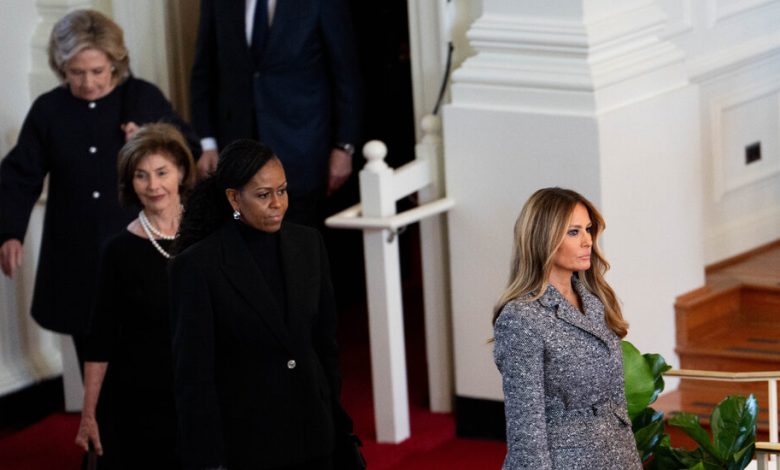Rare Gathering of Former First Ladies Shows Style, and Subtle Differences

In any other circumstance it would have been a shocking sight. But it was only fitting that in her death Rosalynn Carter, the pioneering woman who turned the role of first lady into a job, did one final thing no one else has been able to do this year: lure Melania Trump out of Mar-a-Lago and back into the public eye. Not only that, but she created a situation in which Mrs. Trump was seated right next to Michelle Obama.
Mrs. Trump has eschewed almost every major event since leaving the White House in January 2021, including her husband’s several court appearances (the rare exception being his November 2022 announcement that he was once again running for president). But on Tuesday, as is custom, she joined the three other living former first ladies — Mrs. Obama, Hillary Clinton and Laura Bush — as well as Jill Biden, the current first lady, at the Glenn Memorial United Methodist Church in Atlanta, for Mrs. Carter’s memorial service.
“Rosalynn Carter would be so pleased she brought all of you together on this day,” the journalist Judy Woodruff said.
It was the first time since George H.W. Bush’s funeral, in 2018, that all of the living first ladies had been in one place. (Mrs. Trump did not attend President Biden’s inauguration.) As they sat one next to the other, diplomatically arranged in order of administration — Trump, Obama, Bush and Clinton, with Mrs. Biden next to former President Jimmy Carter — they offered an extraordinary snapshot of what Jason Carter, Mrs. Carter’s grandson, called in his remarks a “remarkable sisterhood.”
Each of them, in their own way, embodied Mrs. Carter’s directive, once offered to Mrs. Obama, that they make the job their own. United (mostly) in black, their differences were in the details.
There, for example, was Mrs. Clinton, in a trademark pantsuit — the one that became her uniform after she left the White House, the one in which she blazed a path as the first first lady to become a senator, presidential nominee and secretary of state — with a collarless long jacket and pearl earrings.
Here was Mrs. Obama, in all-black turtleneck, blazer and trousers, a mix-and-match amalgamation of pieces from different designers (including, for the jacket, Versace). Her hair was pulled back in a low ponytail and left natural, a nod to the sartorial freedom she found after leaving the fishbowl of Washington and navigating the complexities of what it meant to be part of the first Black first family of the nation — including, as she once told Ellen DeGeneres, straightening her hair to make it more reassuring to the white electorate.
There was Mrs. Bush, in a classic black sheath dress and double strand of pearls. And here was Mrs. Biden, in a simple black skirt suit with a pair of Dior slingback pumps with dressmaker tape and little bows at the side.
As it happens, Mrs. Trump was also wearing Dior, one of her favored brands during her time as first lady. But unlike everyone else, she was not wearing black. Rather, that Dior was a gray tweed coat with a voluminous skirt, structured and tightly belted. It was reminiscent of the protective clothing, as well as the luxury labels, that became her signature during the Trump administration.
The color and the style made her stand out, made her look a part of the pageantry but not of it. And they made the choice seem like a symbol — a sign, perhaps, of Mrs. Trump’s historic ambivalence toward the role of first lady and her reluctance to play to the expectations that surround it, as well as her husband’s norm-trampling tendencies. Now, apparently, as when she was in the East Wing. As when she is, or is not, on the campaign trail.
Happenstance? Possibly. But yet another thing that unites first ladies, besides the title, is an understanding of just what it means to play a role in which you are more often seen than heard. And, perhaps, what it teaches you about just how much can be said through the prism of major occasion image-making, preserved for posterity. As this, unquestionably, will be.
